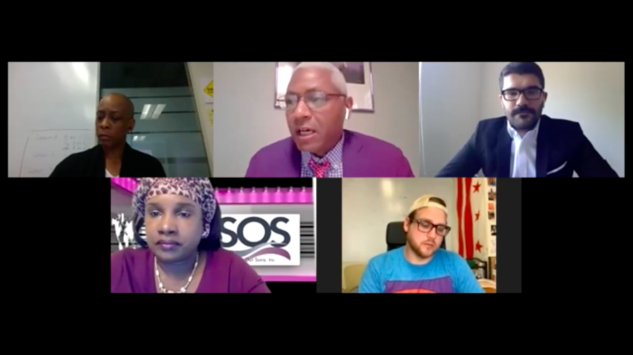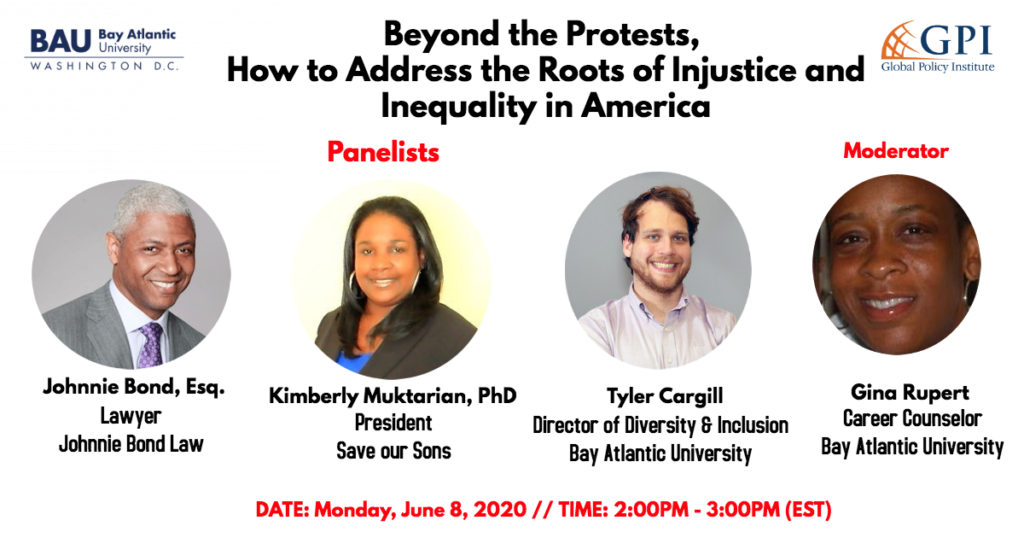Events

Watch the full event here
Event Summary:
Beyond the headlines, it is really important to reflect on the unhealed wounds that stem from the ugly American past of slavery, segregation, Jim Crow Laws, lynching, and the Ku Klux Klan. Sadly, those old wounds are still open and bleeding.
Beyond fair and unbiased law enforcement and legal systems –which are absolutely essential– our rich society has the moral duty to create -now- real opportunity for all those who manifestly do not have it. Poverty and despair grow in poor neighborhoods with bad health services and appalling schools that fail mostly minority students, this way depriving them of a real chance to make progress in their lives.
Muktarian opened the conversation expressing the hope that real resources will be redirected to prevention, in order to help the minorities that are unfairly targeted. She added that, after all the national protests, young Black people feel that now they have been heard. There is also hope that the consciousness of the rest of America has been awakened by this horrible tragedy. Bond pointed out that race has been used and is still used today by politicians for divisive purposes. Now it may be possible to recast the race problem in its real light: achieve the American stated goal of equal justice for all. Cargill explained how he is working in order to bring people together. There is a major task ahead in educating those who do not experience discrimination as to what this is all about. Many believe –he added—that they know the issues. They need to listen to the experience of others and learn the hard truth about racism. Kulak, a Turkish student living in the United States, pointed out that this reality of police brutality and racial bias is difficult to explain abroad to people who still hold idealized views of America as a country of freedom and prosperity. Having viewed the video and seen the protests and some of the acrimony, many foreigners would probably decide against coming to America.
On the issue of police accountability, Bond pointed out that much can be done to make police forces across America truly accountable. Until now, for a host of reasons, bad policemen have been protected by various laws and rules and by their powerful police unions. This has to change. Citizens have to realize that they can bring about change by getting involved, and by voting. Cargill indicated that he tries to engage white people so that they can learn to listen to the voices of the victims. Work with them so that they recognize that there are no easy answers and simple solutions. Muktarian focused on education. Work with schools. Help understand what is holding back young Black students. Help bridge gaps.
On “reforming” versus “defunding” police departments, Bond argued that defunding should not be taken literally. But it should be about seeing the amount of resources going to arming police forces with quasi-military tools. Is this the way we want it? There must be a better way. That said, real police forces reform makes sense. But any serious reform effort is predicated on truly independent evaluations of police departments. A police department doing its own self-evaluation is just a mockery.
Finally, all the panelists agreed that the decision by DC Mayor Muriel Bowser to write “Black Lives Matter” in big, bold yellow letters on a major Street leading to the White House is symbolically important, because it elevates this cause. This gesture gives the Black Lives Matter movement not just greater visibility but true legitimacy and therefore staying power, in America and beyond. Muktarian emphasized that now there is a great deal of energy sustaining the movement. More Americans see the problem and will push for real policy changes. All panelists also agreed that all these national protests caused by the George Floyd tragic killing set in motion a process that will continue until Americans will see real change and real progress.
Johnnie Bond, Esq., Lawyer, Johnnie Bond Law
Johnnie Bond graduated from University of Tennessee College of Law in 2002. During law school he worked as an associate lawyer at HCA Healthcare Company in its General Counsel Office. After law school, Johnnie took a job in the transaction practice group at Armstrong Allen, a large mid-south regional law firm based in Memphis, Tennessee. At Armstrong, Johnnie worked with James McLaren.
Kimberly Muktarian, PhD, President, Save our Sons
Kimberly Muktarian, President of Save our Sons, Inc., is a seasoned advocate with a broad experience in advocating complex cases in both federal and state courts involving criminal, adoption and legal guardianship. Ms. Muktarian also represents clients serving life sentences for drugs and murder.
Ms. Muktarian holds a Doctorate degree in Biblical Counseling and Theology from Justice Fellowship International; a Master’s Degree in Public Administration from Strayer University and Bachelors of Applied Science from Campbell University.
Tyler Cargill, Director of Diversity & Inclusion, Bay Atlantic University
Tyler has been leading the Diversity and Inclusion initiatives for over 900 domestic and international students, human resources, student services and overall leadership at Bay Atlantic University. Tyler has been attending BLM protests since the beginning and he will be sharing his experience and observation from the field.
Discussant
Muharrem Kulak, MBA Graduate, Bay Atlantic University
Moderator
Gina Rupert, Career Counselor, Bay Atlantic University
Welcoming remarks
Paolo von Schirach, President, Global Policy Institute and Chair Political Science and International Relations, Bay Atlantic University.
